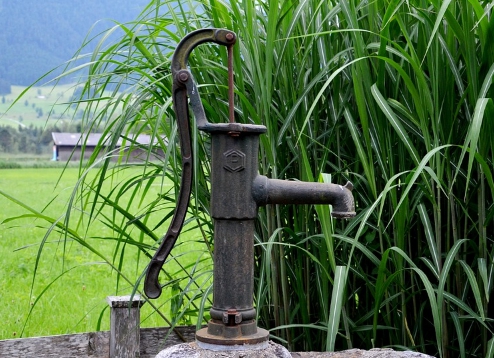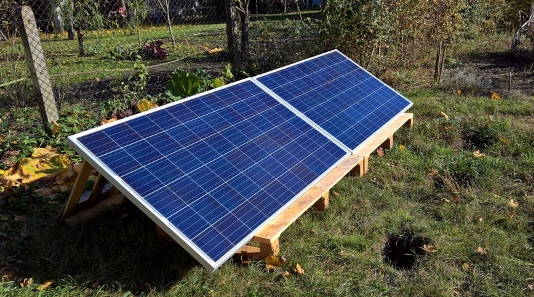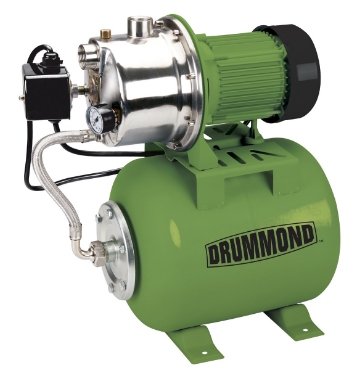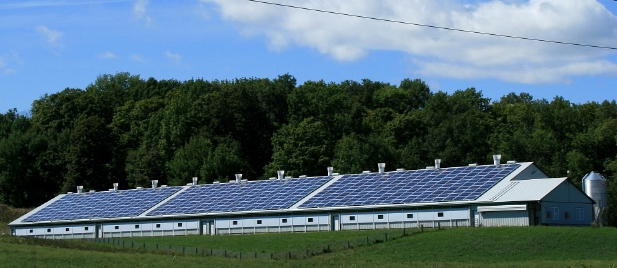Different Types of the Off-Grid Well Water Pumps
It isn’t worth trying to figure out how to move water up without a pump. Collecting water from some wells without a pump is possible. There are old systems with buckets and pulleys.
But, this is time-consuming and requires too much effort for a minimal amount of water. The best set-up is a pump with minimal human interaction. Let the natural elements of the water and either gravity or renewable energy take the load.
There are four main pump choices here:
- a hand pump for a manual action
- the free energy gravity water pump that doesn’t require any electricity
- wind-powered water pump
- solar powered water pump
Hand Pumps
A hand pump is the more obvious, cheaper solution regarding parts. There are no running costs from pumping water without power and no extra components. The problem here is that this requires a lot of manpower. Users have to handle the pressure and force, with enough effort to pump out the required water supply. Depending on the weather this work can be particularly challenging in hot climates.

Gravity Pump
The first alternative to this man-powered solution is to use a gravity-powered water pump. These complex systems of valves rely on natural forces to push the water out of the source. While the science is sound, this doesn’t suit all situations. These setups need a lot of machinery and underground pipes, which may not work on all terrains.
Wind Power Pumps
The most appealing solution is to find a form of the off-grid well water pump that uses a renewable energy source. In other words strong, reliable power – without turning to major suppliers on the grid. One option is to use wind power. The appeal here depends on the location and budget of the user. A wind turbine can generate a lot of energy in the right position, but little on calm days. So not always reliable, and could be an issue in times of need. These set-ups can also be expensive and unsightly.
Solar Powered Pumps
The alternative is to go far an off-grid solar water pump system. This is a much more appealing option in terms of the look, cost, and output. A strong solar system with efficient power generation can power a water pump for a consistent supply. The benefits of this approach are evident once users get up and running.

Why Solar Powered Pumps?
As will most situations there are different options to suit different needs. However, many farmer, cabin owners, and other users would agree that solar powered off-grid water well pumps are the best approach. Using a solar-powered generator vs. a gasoline-powered generator makes more sense.
Main Reasons For Solar Power Generators
1. Ease of Use In Remote Areas
Solar is already a power supply of choice in remote locations, such as farms, ranches, and cabins in the wilderness. Why pay out to hook up to grid energy where there are cost-effective solar solutions to run the pumps to the home and/or business?
This means that a solar set up for the water supply is a simple addition to a current venture. It doesn’t take much to set up another generator and a few panels in the middle of the property. The small size of these units means they are also easily shipped.
2. Cost Analysis
Cost is always important with any investment like this. A high initial cost in machinery or mechanics needs to balance out with low running costs or low maintenance needs. This is where solar helps. The running and maintenance costs are low compared to other approaches. This means savings over time, which can go into other important schemes.
3. Supply And Demand
Then there is fact that the productivity of a solar system can match the demand. This is an important difference between these solar systems and wind options. With wind, there could be times of drought on calm days. This means an increased need for water, but no immediate source of wind energy. This isn’t the case with solar.
Those hotter days and times of drought coincide with sunny days. The greater the need for water, the greater the chance that the sun will be out to power the pump. There will be less power on rainy days, but here farmers and preppers can rely on rainwater collection instead.

Key Solutions Where Solar Powered Water Pumps Help
All these benefits of solar off-grid well water pumps are clear when we look at some of the applications available. As mentioned above, there are many potential situations where these water sources will help. They include:
- disaster areas and sites of severe weather events.
- remote areas in developing countries in need of aid
- off-grid solutions for eco-friendly homes and cabins
- a secure, personal water supply for survivalists.
1. Disasters And Weather Events
This is an important benefit in today’s climate. Regardless of the denial of politicians, climate change has a devastating impact on communities all the time. Recent hurricanes and storms in the Caribbean, Florida, and Texas have highlighted this increase. This means more and more communities and homes isolated without power and clean water. A solar powered pump, on a personal well, is, therefore, a great backup solution. Many homes in at-risk areas now rely on solar powered generators for electricity and heat. A connection to a well pump increases the functionality.
2. Aid In Developing Nations
There are similar risks in developing nations with communities cut off by famine, poverty, war and other disasters. They often don’t have the aid or finances to be self-sufficient. Some families have to travel long distances to find clean water. Many risk drinking and bathing in unsanitary conditions. Charities that provide water aid do so with localized water supplies from wells and other ground sources. Solar powered pumps in these hot climates will increase the efficiency of the projects.
3. Eco-Friendly Homes And Cabins
There are many homes, barns or ranches and other properties across the US where residents see the potential in off-grid power solutions. Some choose to abandon grid power because of the cost, while others do so for environmental reasons. This means a leaning toward solar-powered solutions for the home. Solar power generators, rooftop panel installations, and other gadgets help. Solar powered water pumps on personal wells take this in an interesting new direction. The homeowner can now harness energy and water for greater self-sufficiency.
4. Secure Water For Survivalists
Then are those that want to be fully prepared for the worst. Self-reliance goes further than personal water and food supplies for preppers and survivalists. There is the fear that if – or when – society collapses, the water supplies will be off limits. A loss of manpower and electricity could put city-wide water sources and irrigation at risk. There is also the concern that this wide-spread source may become infected with a disease and other pathogens. This is an extreme view, and some people will laugh off these fears. Yet, those that truly believe in prepping for this situation will have a solar-powered water source on their list of must-have items.
Selecting the Pumping System and Power Supply
Of course, this effective, productive pumping system is only possible with all the right components.Users can live in a sunny climate, with a great supply of water underground, but fail to utilize the opportunity. These solar systems require the best combination of the following
- Pump
- Power Source or Generator
- Solar Panels Sizes
- Storage Requirements
1. Figure Out Pump Equipment
There are plenty of factors to consider when looking for a strong reliable pump for your water supply. First of all, it needs to be powerful enough to handle the volume of water required. This is where it helps to look at the vertical lift and the flow. The best pumps will have a vertical water lift of around 2 meters and a variable flow that adjusts to demands. The pump also needs to be durable, with the best materials and construction for the job. Thankfully, there are many high-quality models with brushless DC motors these days. A lack of maintenance costs is a bonus, but only with a good product.
2. Correct Power Source or Generator
Then the system needs the right generator to power the pump in safe, effective manner. These generators can supply power, from a solar source to the pump and any other equipment as needed. They are a great investment for the property in times of blackouts, bad weather and other emergencies. There are lots of different considerations with solar power generators. The output is a start, but so is the size and the noise produced. The good news here is that these solar generators are quieter, more efficient and more environmental than old gas-powered models.
3. Selecting The Right Size Panels
This system can only generate the right amount of power to the water pump with the right panels. It is important to match the right panels to the productivity of the pump. The great thing about solar is that newcomers can start small and upgrade. If a water pump is slow and unresponsive, or the generator doesn’t have enough power, users can add more panels. This modular approach means farms can expand their pumping and irrigation at a later date. It is also important to remember to place the panels in the best position for optimal conversion. This means direct sunlight, with no shade from trees or buildings.
4. Adequate Storage
Then there is the storage. There are actually two types of storage to consider this solar powered water pumping solution. The first is the storage of the water. Those with ongoing solar pumping actions need a secure reservoir to hold the drinking water. This means somewhere with ease of access at any time of day. Then there is battery storage. Solar power is a great aid when the sun shines. However, users may need clean drinking water in an emergency, like a long-term storm. This is where a backup supply of solar power helps.
Final Solution
While there are sure plenty of self-powered water pumps that do the job, these solar systems offer the most benefits. Cost, ease of use and productivity are all important here, and solar delivers. There are so many reasons to look into solar-powered water pumps, and the list is growing. This is not a luxury item for the farmer or survivalist that wants a convenient way to pump a groundwater source.
These effective systems could provide clean water in times of crisis. They can help families deal with natural disasters or communities in impoverished nations. A strong set-up will provide a reliable water supply with free, green energy and minimal fuss. There is no better way to manage a personal water supply than that.
It pays to find the best off-grid well water pump for the situation and location.


